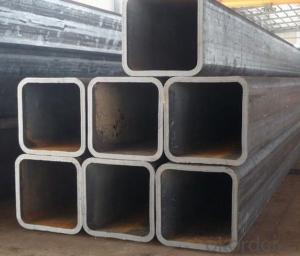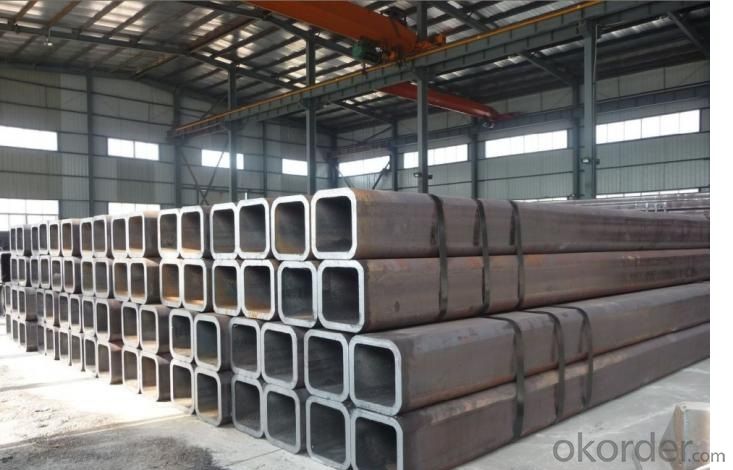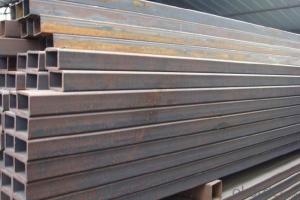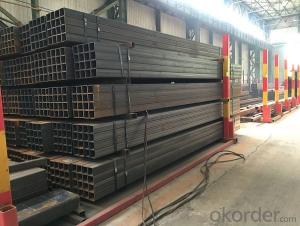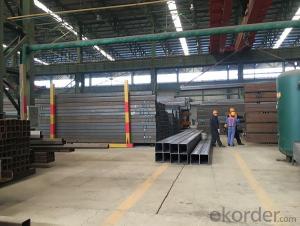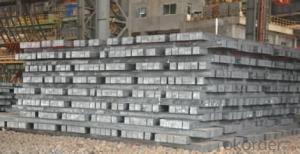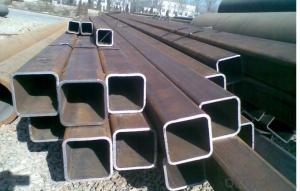Steel Pipe --Various Standard Rectangular Steel Pipe
- Loading Port:
- Tianjin
- Payment Terms:
- TT OR LC
- Min Order Qty:
- 25 m.t.
- Supply Capability:
- 8000 m.t./month
OKorder Service Pledge
OKorder Financial Service
You Might Also Like
1、Structure of Rectangular Steel Pipe API SPEC 5CT:
Rectangular Steel Pipe is to be used for conveying gas, water, and petroleum foroil and natural gas industries. And used for structural steel pies purpose. As the manufacturing process does not include any welding, Rectangular Steel Pipe are perceived to be stronger and more reliable. Historically Rectangular Steel Pipe was regarded as withstanding pressure better than other types, and was often more easily available than welded pipe.
2、Main Features of Rectangular Steel Pipe API SPEC 5CT:
• High manufacturing accuracy
• High strength
• Small inertia resistance
• Strong heat dissipation ability
• Good visual effect
• Reasonable price
3、Rectangular Steel Pipe API SPEC 5CT: Specification:
Standard | GB, DIN, ASTM ASTM A106-2006, ASTM A53-2007 |
Grade | 10#-45#, 16Mn 10#, 20#, 45#, 16Mn |
Thickness | 8 - 33 mm |
Section Shape | Round |
Outer Diameter | 133 - 219 mm |
Place of Origin | Shandong, China (Mainland) |
Secondary Or Not | Non-secondary |
Application | Hydraulic Pipe |
Technique | Cold Drawn |
Certification | API |
Surface Treatment | factory state or painted black |
Special Pipe | API Pipe |
Alloy Or Not | Non-alloy |
Length | 5-12M |
Outer Diameter | 21.3-610mm |
Grade | 20#, 45#, Q345, API J55, API K55, API L80, API N80, API P110, A53B |
Standard | ASME, ASTM |
1) Material:20#(ASTM A 106/A53 GRB.API5LGRB,GB),45#,16Mn,10#.
2) Specification range:OD:21.3-610mm,WT:6-70mm,length:6-12m or according to the requirement of clients.
3) Excutive standards:GB,ASME API5L.ASTM A 106/A53,Despite of the above standards,we can also supply seamless steel pipe with standard of DIN,JIS,and so on,and also develop new products according to the requirements of our clients!
4) Surface:black lacquered,varnish coating or galvanized.
5) Ends:Beveled or square cut,plastic capped,painted.
6) Packing:bundles wrapped with strong steel strip,seaworthy packing.
4、Packaging & Delivery
Packaging Details: | seaworthy package,bundles wrapped with strong steel strip |
Delivery Detail: | 15-30days after received 30%TT |
5、FAQ of Rectangular Steel Pipe API SPEC 5CT:
①How is the quality of your products?
Our products are manufactured strictly according to national and internaional standard, and we take a test
on every pipe before delivered out. If you want see our quality certifications and all kinds of testing report, please just ask us for it.
Guaranteed: If products’ quality don’t accord to discription as we give or the promise before you place order, we promise 100% refund.
②How about price?
Yes, we are factory and be able to give you lowest price below market one, and we have a policy that “ for saving time and absolutely honest business attitude, we quote as lowest as possible for any customer, and discount can be given according to quantity”,if you like bargain and factory price is not low enough as you think, just don’t waste your time.Please trust the quotation we would give you, it is professional one.
③Why should you chose us?
Chose happens because of quality, then price, We can give you both.Additionally, we can also offer professional products inquiry, products knowledge train(for agents), smooth goods delivery, exellent customer solution proposals.Our service formula: good quality+good price+good service=customer’s trust
SGS test is available, customer inspection before shipping is welcome, third party inspection is no problem.
6、 Rectangular Steel Pipe API SPEC 5CT: Images:
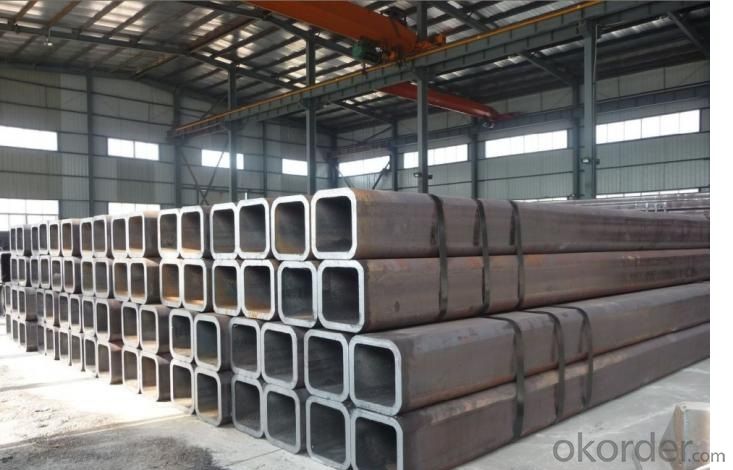
- Q: How do you repair damaged steel pipes?
- To repair damaged steel pipes, there are several steps that can be followed: 1. Identify the extent of the damage: Assess the severity of the damage to determine if it can be repaired or if the pipe needs to be replaced altogether. 2. Isolate and drain the section: Shut off the water supply to the damaged section of the pipe and drain any remaining water to prevent further leakage or damage. 3. Clean the damaged area: Remove any dirt, rust, or other debris from the damaged area. This can be done using a wire brush or sandpaper. 4. Prepare the damaged area: Roughen the surface of the damaged area using coarse sandpaper. This will help the repair material adhere better to the pipe. 5. Choose a repair method: Depending on the size and location of the damage, there are various repair methods available. Some common options include using epoxy putty, pipe wraps, or clamps. 6. Apply the repair material: Follow the instructions provided with the chosen repair method to apply the material to the damaged area. Ensure that it covers the entire damaged section and extends slightly beyond it for added protection. 7. Allow the repair to cure: Give the repair material sufficient time to cure as per the manufacturer's instructions. This will ensure a strong bond and effective sealing of the damaged area. 8. Test the repair: Once the repair has cured, turn the water supply back on and check for any leaks. If there are no signs of leakage, the repair is successful. Otherwise, reevaluate the repair or consider seeking professional assistance. It is important to note that these steps provide a general guideline for repairing damaged steel pipes. However, the specific repair method may vary depending on the size and severity of the damage. In complex cases or if unsure, it is recommended to consult a professional plumber or pipe repair specialist.
- Q: How are steel pipes coated to prevent corrosion?
- To prevent corrosion, steel pipes can be coated using different methods and materials. One common approach is to apply a protective layer of paint or epoxy on the pipe's surface. This coating acts as a barrier between the steel and the external environment, preventing direct contact with moisture and corrosive substances. Another technique involves galvanization, where the steel pipes are coated with a layer of zinc. Zinc is highly resistant to corrosion and acts as a sacrificial anode. In case of any damage to the coating, the zinc corrodes instead of the steel, ensuring the steel remains intact and free from corrosion. Polyethylene or polypropylene materials can also be fused onto the steel surface, creating a strong bond that provides excellent resistance against corrosion. This method, known as fusion bonding, is commonly used in offshore and underground pipelines. Moreover, a layer of corrosion-resistant alloy can be applied to the steel pipe. This alloy is typically a combination of metals such as nickel, chromium, and molybdenum, which offer superior protection against corrosion in harsh environments. The choice of coating method depends on factors like operating conditions, the presence of corrosive substances, and the expected lifespan of the steel pipes. By effectively applying these coatings, steel pipes can be safeguarded against corrosion, extending their durability and ensuring the integrity of the infrastructure they are used in.
- Q: What are the different methods of pipe insulation for steel pipes?
- There are several methods of pipe insulation for steel pipes, including foam insulation, fiberglass insulation, mineral wool insulation, and reflective insulation. Foam insulation is a popular choice as it provides excellent thermal insulation and is easy to install. Fiberglass insulation is another common option that offers good thermal and acoustic insulation properties. Mineral wool insulation is known for its fire resistance and is often used in high-temperature applications. Reflective insulation, on the other hand, utilizes a reflective surface to reduce heat transfer and is commonly used in hot climates.
- Q: How to perform nondestructive inspection of steel tubes
- Radiographic inspection (RT)One of the earliest nondestructive testing methods is widely used in the inspection of internal defects of metals and non-metallic materials and products, with a history of at least 50 years. It has incomparable unique advantages, that is to test the correctness, reliability and intuition of the defects, and the ray film can be used for the analysis of defects and as a quality certificate archive. But this method also has the disadvantages of more complicated equipment and higher cost, and should pay attention to the protection of radiation.
- Q: How are steel pipes used in the manufacturing of oil refineries?
- Steel pipes are used in oil refineries for a variety of purposes, including transporting crude oil and other fluids, as well as for structural applications. They are commonly used for piping systems, carrying process fluids such as oil, gas, and water, throughout the refinery. Additionally, steel pipes are used to handle corrosive and high-pressure environments, making them essential for the safe and efficient operation of oil refineries.
- Q: How are steel pipes used in the manufacturing of agricultural machinery?
- Steel pipes are commonly used in the manufacturing of agricultural machinery as they are strong, durable, and resistant to corrosion. They are used to create the framework and structural components of various agricultural equipment such as plows, tillers, planters, and harvesters. Steel pipes provide stability and strength to these machines, allowing them to withstand heavy loads and operate efficiently in tough farming conditions.
- Q: How are steel pipes insulated against heat loss?
- There are multiple ways to insulate steel pipes to prevent heat loss. One widely used method involves utilizing insulation materials like mineral wool or fiberglass wraps. These materials are wrapped around the pipes, forming a barrier that reduces heat transfer. Another approach involves directly applying insulation coatings like foam or rubber coatings onto the pipe's surface. These coatings create a protective layer that minimizes heat loss. Additionally, thermal tape or heat-resistant tape can be employed to seal any gaps or joints in the insulation, ensuring a continuous barrier against heat loss. In summary, effectively insulating steel pipes is crucial to maintaining the desired temperature of the fluid or gas being transported and enhancing energy efficiency across diverse industries.
- Q: How are steel pipes used in the construction of stadiums and arenas?
- Steel pipes are commonly used in the construction of stadiums and arenas for various purposes. They are primarily used for the structural framework, supporting the weight of the building and providing stability. Steel pipes are also used for the installation of HVAC systems, electrical wiring, and plumbing, allowing for efficient distribution of utilities throughout the facility. Additionally, steel pipes are utilized for the construction of handrails, fences, and barriers, ensuring safety and security for spectators.
- Q: Can steel pipes be used for conveying abrasive slurries?
- Indeed, abrasive slurries can be effectively conveyed through steel pipes. The remarkable durability and strength of steel pipes render them highly suitable for the transportation of abrasive substances like slurries. Nevertheless, to guarantee prolonged service life and avert excessive deterioration, it is crucial to carefully choose the right grade of steel and take into account factors such as pipe thickness, lining choices, and flow velocity. Furthermore, the implementation of adequate maintenance and inspection protocols can play a pivotal role in promptly identifying and resolving any wear or corrosion issues that may arise with time.
- Q: What is PE coated steel pipe? Seek explanation
- PE pipe is a kind of thermoplastic resin with high crystallinity and non polarity.
Send your message to us
Steel Pipe --Various Standard Rectangular Steel Pipe
- Loading Port:
- Tianjin
- Payment Terms:
- TT OR LC
- Min Order Qty:
- 25 m.t.
- Supply Capability:
- 8000 m.t./month
OKorder Service Pledge
OKorder Financial Service
Similar products
Hot products
Hot Searches
Related keywords
